#japanese occupation of korea
Explore tagged Tumblr posts
Text
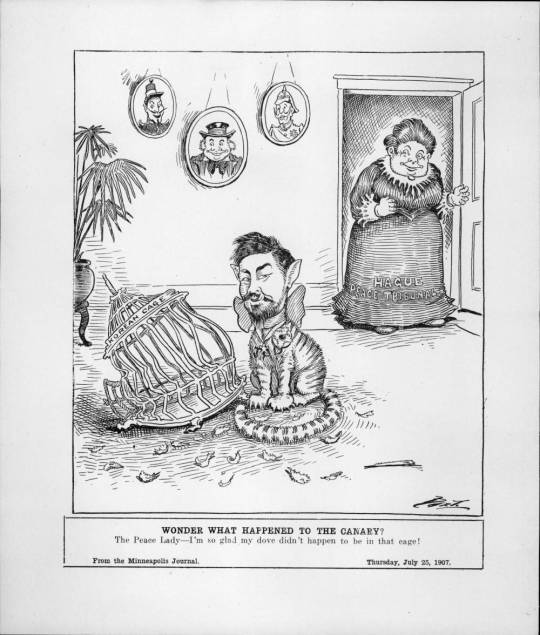
Wonder What Happened To the Canary?
July 25, 1907
The Japan cat licks its lips by the empty Korean birdcage; the Hague Peace Tribunal smiles as portraits of England, Germany, and France look on.
The caption reads "The Peace Lady - 'I'm so glad my dove didn't happen to be in that cage!'"
Japan had forced the abdication of Korea's Emperor after he secretly sent delegates to the Hague Peace Conference requesting help. The conference refused to see the delegates, allowing Japan to continue their annexation of Korea.
From Hennepin County Library
Original available at: https://digitalcollections.hclib.org/digital/collection/Bart/id/5820/rec/205
#charles bartholomew#political cartoon#japanese history#japanese occupation of korea#korean history#hague convention#peace
4 notes
·
View notes
Text
Harbin (2024) is One of the Best Movies of the Year
Harbin (2024) is One of the Best Movies of the Year. Master Marc Zirogiannis reviews this great film #Harbin @WellgoUSA #HarbinMovie #martialartsmovies
December 27, 2024 (NYC, NY)– Harbin (2024) is One of the Best Movies of the Year. Director Woo Min-ho’s has masterfully told the dramatic story of the 1909 Japanese invasion of Korea, and the a plot of the Korean resistance to assassinate the Japanese Prime Minister. This Well Go USA release is based upon a series of real events, and it is very well crafted. This award winning film is a…
#Hyun Bin#Japanese Occupation of Korea#Jeon Yeo-been#JO Woo Jin#Korean History#Lee Dong-wook#Marc Zirogiannis#Park Jeong-min#South Korean Films#Well Go USA#Woo Min-ho
0 notes
Text
Was largely unenthused by the characterization of the main villain in Gyeongseong Creature (she's doing all this because the guy she liked doesn't like her back?) until I applied 2 seconds of critical thinking and realized she's just occupation-era Japan. She goes on and on about how the lead betrayed their Special Friendship (ignore the power dynamic in her favor) which means he should be unflinchingly loyal, how could he do this to her, doesn't he appreciate everything she's done despite his lowly status. If you kept my favor and played by my rules you could be rich and comfortable, just ignore the blood and bodies and screaming. The colonial relationship in miniature via an immortal femcel to really illustrate how self-deluded the whole thing is
#how dare you refuse my love (agitate for an independent nation)#writing this with a fairly cursory knowledge of the Japanese occupation of Korea#meanwhile the anti-hero in season 2 has such middle school OC energies I'm honestly appreciating it#biracial monster hybrid with heterochromia raised by the big bad but besties with the main lead#he is Tortured. he was Experimented On. he has tentacles
8 notes
·
View notes
Text
Wei other malaysian dont forget lah ni what the Yamato Japanese do to us 😭😭😭😭 kenapa aku nampak flag rising sun!?!??!?!??? Kat kerata orang WEIIII??????? ???????
Also general reminder for people in general hey research about Japanese imperialism and what the Japanese did to Korean and Chinese AND SOUTH EAST ASIA i feel like South east asia mesti forgotten in this conversation too, and what Yamato Japanese do against the indigenous Ryukyuan people cuz like wei I see american being super rude to chinese people who offended at imperialistic depiction and people on general mindlessly walking over the very weird anti indigenous sentiments very popular in japanese media or media depicting japan
Since japanese media and inspiration so popular its insanely crucial people understand the history or at least the base dynamics of japan and other countries like china, korea, and the whole of south east asia cause yawlah yall just gloss over propoganda and the fashion of colonial violence so easily 😭😭😭its fr scary
Especially when people take chinese trends and call it japanese WEI WHY ARE YOU DOING THE COLONIZING FOR THEM 💔💔💔💔💔 and people outside generally demeaning and making light of these horrible things when its referenced or outright named in media like heyyy....
#malaysian#japanese occupation#malaysia#south east asia#indonesia#china#korea#japan#ryukyuan#indigenous#this a reminder now wei#Philippines#honestly the entire of south east asia got pain from japan#when I was a small child of 4 years old i knew nothing of se x or even r ape in its fullest scope but I understood exactly what#comfort women meant#and i guess that sounds contradictory but i remember understanding perfectly what that meant especially in the context#of my own people
9 notes
·
View notes
Text
i feel so guilty liking anime/manga as a korean like yeah a lotta koreans like anime but like at the same time my dad REALLY doesn't like japan and japanese culture and stuff which is understandable but 😭😭 i'm asking him if i can go out and buy manga and like 😭😭
#❤︎ journal#AND IT'S WORSE BC MY GRANDMA LIVED THRU THE JAPANESE OCCUPATION OF KOREA#and i feel so guilty#and no i don't support their government or their actions#but i like my soccer playing hormonal boys... </3#yeah.#it's a dilemma
9 notes
·
View notes
Text
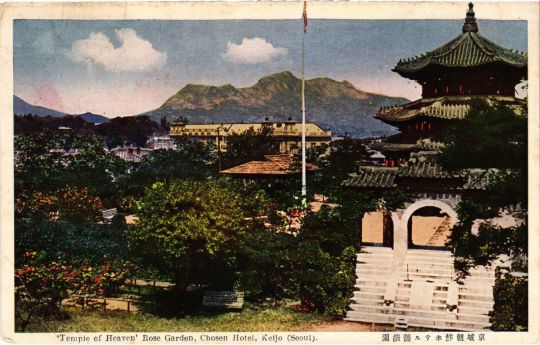
Temple of Heaven's rose garden and Chosen Hotel in Seoul, South Korea, during the Japanese occupation
Japanese vintage postcard, mailed in 1924 to San Francisco
#old#postcard#south korea#korea#postkaart#garden#japanese#vintage#briefkaart#san francisco#postal#ansichtskarte#temple#ephemera#chosen hotel#photography#south#occupation#san#photo#seoul#francisco#postkarte#tarjeta#mailed#chosen#hotel#heaven#historic#sepia
14 notes
·
View notes
Text
I finished Whale Star. Man... I knew that it was a little mermaid retelling, and it wasn't gonna be a happy ending, but it was still so sad to reach the end and see it happen. I am really impressed with how the author pulled off a historical fiction fairy tale retelling, and especially how it translated at the end. I was really curious how the mermaid sacrificing herself for the prince would play out, and it did not disappoint.
I don't like historical fiction generally, but I really enjoyed this one because of the little mermaid parallels. I would be willing to read more historical fiction if it was written as a fairy tale retelling.
#i now know more about the Japanese occupation of Korea in the 1920s than i every learned in school#the foot notes were very helpful#fairytales#fairy tales#historical fiction#webtoons#whale star: the gyeongseong mermaid#whale star#fairy tale retellings#reading rat
25 notes
·
View notes
Text
>If X was really a total dictator who cared only about power, it would be much easier for him to align with a super-power that could protect their position >X is aligned with a super-power that can protect their position It's like pottery
The thing is that if Kim Jong Un really was a total dictator who cared only about power and cruelty, it would be so much easier for him to ally with the US and be just like the Gulf monarchs or Pol Pot or one of the other million of criminals on Washington’s payroll. Recent wars have demonstrated very blatantly that US puppet leader is a great job for someone whose primary passions are killing babies and threatening their neighbors with nukes. For heads of state looking to sell out their people, Washington is the top buyer.
Literally what is there to be gained from the DPRK’s “isolationist” policies other than the security of its people?!
#North Korea historically wasn't even isolationist#It was a soviet borderline puppet state at first and steadily became more autonomous as it developed and recovered from Japanese occupation#The collapse of the USSR is what resulted in the modern status quo for north Korea as it effectively nuked its economy#Despite this North korea remains closely allied with both China and Russia#It's most likely that this isolationism serves as a way to defend themselves from the much more successful South#It's likely that a normalization of relations would at some point result in reunification#And that would weaken the ruling class of North Korea#They'd go from the unquestioned rulers of a country to merely part of a system where they wouldn't even be the richest oligarchs#And with the status quo they are very wealthy capital holders that enjoy support from 2 of the most powerful countries on the planet#communism
1K notes
·
View notes
Text
Page 30 into The Jakarta Method reading, and I am shook. No wonder so many people become agitated when you mention communism here... I remember when I used to be like that too...
#Tangent:#shoutout to korea for banning communism /s#'bu- but north korea has dictatorship!!'#fools WE ALSO HAD DICTATORSHIPS smh#'bu- but Japan!!'#JAPANESE COMMUNIST PARTY BACKED KOREA THROUGHOUT THE OCCUPATION YOU FOOLS#IN FACT THEY WERE THE ONLY POLITICAL PARTY TO DO SO#I hate the term puppets when we speak of world politics since I feel like it shifts the blame heavily and oversimplifies things#So I'm going to call my country the United States of South Korea
0 notes
Text
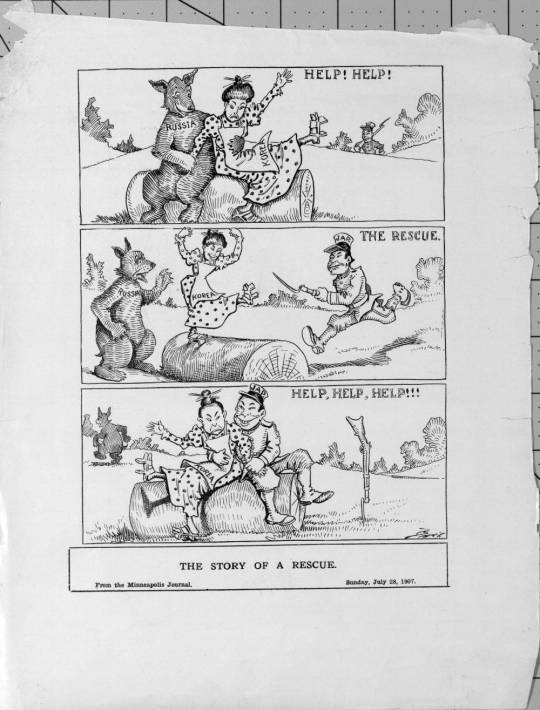
The Story Of a Rescue
July 28, 1907
In the first panel, Korea shouts for help as she is assaulted by the Russian Bear. In the second panel, Japan Rescues her. In the third panel, she shouts to be saved from Japan.
The Japanese had driven the Russians out of Korea during the Russo-Japanese War, but had proceeded to make it a protectorate, and slowly taken over the country.
From Hennepin County Library
Original available at: https://digitalcollections.hclib.org/digital/collection/Bart/id/6112/rec/208
#charles bartholomew#political cartoon#russo japanese war#korean history#japanese occupation of korea#japanese history
1 note
·
View note
Text
Translation Tuesdays: Mater 2-10, by Hwang Sok-yong
Mater 2-10, by Hwang Sok-yong, chronicles Jino’s sit-in, weaving together Korean history and Jino’s family history into a multi-generational saga.
Via A series dedicated to literature in translation whether classic or contemporary. Translated by Sora Kim-Russell & Youngjae Josephine Bae Originally published by Changbi Publishers (2020) Scribe (2023) “When nine-tenths of Africa had been seized (by 1900), when the whole world had been divided up, there was inevitably ushered in the era of monopoly possession of colonies and,…
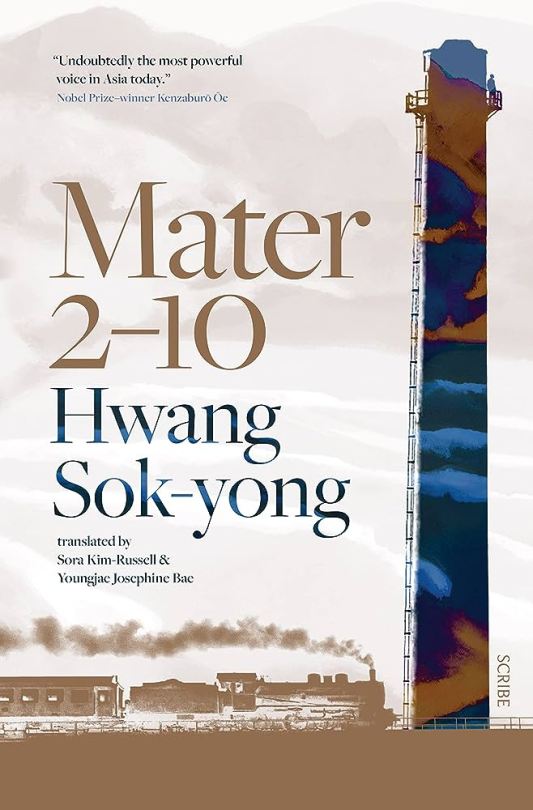
View On WordPress
#asia#book#book reviews#capitalism#colonialism#communism#Dune#economics#exploitation#fiction#Hwang Sok-yang#imperialism#Japanese Empire#Japanese occupation#KLit#Korea#Korean Literature#Korean War#langfocus#language#Lenin#Marxism#Mater 2-10#politics#Scribe#Sora Kim-Russell#translation#Translation Tuesdays#world war 2#Youngjae Josephine Bae
0 notes
Text


The Handmaiden (2016) dir. Park Chan-wook // Interview with the Vampire episode 11 (2024) dir. Levan Akin
He lost his Hindu-originated name “Arun” when he was trafficked from Dehli as a child, was renamed “Amadeo” by his paedophile Maker the vampire Marius, then finally assigned “Armand” by the Roman coven before they sent him to France. He’s also lost his voice in a way, shown code-switching and adopting different accents in different settings. Throughout world history, colonised peoples have often been forced to adopt the languages and names of their oppressive colonisers as a way to erase their cultural identities.
Armand’s history was essentially colonised. His personal sexual trauma is an allegory for wider colonial trauma. This idea was explored similarly in Park Chan-wook’s 2016 film The Handmaiden, where the character Hideko’s forced exposure to pornographic Japanese literature as a child is meant to parallel the colonial oppression of the Japanese occupation of Korea.
The only evidence remaining of Armand’s experiences of sexual and colonial violence is this painting The Adoration of the Shephards With a Donor that hangs in the Louvre. Another cruel irony here is that ‘Adoration of the Shepherds’ is an episode of Jesus’s nativity. Arun as a (presumably) Hindu boy was used as a prop in a Christian narrative. The one historical document that exists of his mortal life is a depiction of his religious assimilation. Completely divorced from his roots, with no identity outside the roles his abusers assigned him, Armand, Amadeo, and Arun “were cut loose and dead like children turned to stone.” Being immortalised, “donated”, and placed on display in a European museum, a space he’s not even really allowed to access, for the mostly-white gaze is a clear metaphor for colonisers’ persisting theft of cultural artefacts belonging to their victims.
The only consolation this journey has for Armand is creative inspiration. He took Amadeo, trapped in the horror of his youth for the entertainment of others, and transferred that idea into the play My Baby Loves Windows to torture Claudia.
Armand, colonialism, and the weaponisation of anti-Blackness by Deah
#the handmaiden#park chan wook#kim min hee#fingersmith#lgbtcinema#film#fm#interview with the vampire#iwtv#levan akin#armand#the vampire armand#armand iwtv#assad zaman#tv#*#q#*misc#iwtvedit#lgbt media#horror#dsg#1k
1K notes
·
View notes
Text
So. FFXIV released a new mogstation outfit that's Korean called the Far Eastern Performer's Attire. Yippee! Pungmulnori is one of my favorite things about Korean culture so I was very happy that it's an outfit I could wear in the game
Except

Why the fuck is it called Hingan?



Hingashi is clearly based on Japan, so calling an outfit that is KOREAN Hingan is extremely disrespectful to the history between the two nations, being Japan's attempt to erase Korean identity/culture during their occupation of Korea before and during WWII
This is only an issue in the English store, by the way. The French/German/Japanese shop listings only mention Far Eastern.
Not to mention that the items are also listed using Japanese terms!!! What the hell??? (EDIT: I have discovered that the other localizations also used Japanese names for the items, but their store listings don't say it's Hingan)

Ao Dai is listed in their Vietnamese name. Hell, the Mun'gaek Uibok is romanized Korean!
Square Enix mentioned how with Dawntrail they're placing greater care into the cultures they're taking inspiration from, yet the English localization team turns around and does this shit.
If you have a forums account, please boost the thread I created based on this, and share this around so that others can see!
488 notes
·
View notes
Text
Some background on South Korean politics in light of the 12.3 self-coup attempt
At 10:23 PM on 12.3, President Yoon Suk-yeol (Yun Seokyeol) declared martial law. The Korean people and MPs immediately mobilized to stop it. Although a group of special forces stormed the Parliament building and tried to break up legislative activity, 190 MPs made it into the chamber and voted only two hours later to rescind martial law. Soon after that, Yoon agreed to end martial law and the military officially stood down.

This was a bizarre and shocking few hours for everyone in the country and the world, and how Yoon got to the point of making this absurd decision is an interesting story. To tell it, I'll try to explain 1) South Korea's history of military rule, 2) Yoon's prosecutorial and political career, 3) the main opposition Together Democratic Party, and 4) Yoon's presidency. And finally, 5) what the self-coup attempt means for South Korea and the world.
I'll try to be brief as I can, but I'm starting from the assumption that most people know very little about South Korean politics. So, it's a long post.
Military rule
After fascist Japan surrendered at the end of WW2, it handed over power in the occupied Korean peninsula to an indigenous government called the People's Republic of Korea. Unfortunately, the new government was brutally suppressed by the US military in the South and warped into unrecognizable form by the Soviet Union in the North. In the South, the Republic of Korea was established as a US-aligned anticommunist dictatorship. Everything in this summary is extremely simplified, but suffice it to say that the Republic of Korea, or South Korea, more or less remained an anticommunist military dictatorship until 1987.

(One of the less graphic pictures of the Bodo League massacre, where the South Korean police and military killed 200,000 civilians)
Military rule in South Korea was founded on protecting South Korean capitalists, many of which had accumulated their wealth under the Japanese occupation, from the dual threats of leftists in South Korea and North Korean attack. South Korea retained the vast majority of colonial police employed by the occupation government, whose main purpose had been to root out and destroy independence guerillas, and repurposed them to root out and destroy left-wing guerillas (many of which were the same people). This caused an extraordinary level of state violence in early South Korean history. The South Korean prosecution service was similarly used to find and imprison or kill the opposition. Due to their function as part of an authoritarian state, the prosecution service was given broad powers to both investigate and prosecute.
Especially after President Park Chung-hee (Bak Jeonghui) took power (by overthrowing another short-lived democratic government), the South Korean state's purpose became not only to protect capital, but also to direct its expansion. The South Korean state used its control over credit to make companies invest in sectors that it predicted would have great export potential. Once a company established itself in a sector, the state directed it to use the profit it got from exports to invest in another, more capital-intensive sector. Over decades, this strategy led to enormous economic growth for South Korea and a massive rise in living standards. It also caused a few companies in particular to become fantastically wealthy global megacorporations. These are the chaebols (jaebeol), which include Samsung, Hyundai, LG, and others.
By 1987, a series of massive democratic protests and uprisings finally ended the dictatorship. A free election was held, and a general named Noh Tae-woo (No Taeu) was elected president. In the new democratic era, the conservative movement was formed as an alliance of dictatorship figures like Noh, chaebols, small businesses, and white collar workers who wanted to continue the economic policies of the dictatorship. The democratization movement continued as various incarnations of the Democratic Party (South Korean political parties change names and split and merge constantly), made up of unions, civil society activists, and students. Leftists have continued to be a minor force in South Korean politics, but for the purposes of this post I'll mostly set them aside. The main groups we're concerned with are conservatives and democrats, organized into a constantly shifting mush of political parties.
Supreme Prosecutor of the Republic
Before he became president, Yoon Seok-yeol was the Supreme Prosecutor of the prosecution service. To understand the significance of this, we have to take a look at the prosecution service in the democratic era and the political environment that Yoon emerged into.
During the dictatorship, everyone hated the police. So after the dictatorship, South Korea thoroughly reformed and defanged the police. This was a genuine success of the democratization movement. The police were turned from a gang of brutal thugs into an organization that almost never uses guns and is known for getting yelled at and beaten up by random citizens. If you hit a South Korean cop, the cop might be punished for annoying you. (Though the situation is different for ethnic minorities and striking workers.)
On the other hand, the prosecution service was left mostly untouched. While it obviously was no longer used for open political repression, it largely retained its broad investigative powers and personnel.
To put it simply, the prosecution service is an authoritarian holdover inside a democracy. It justifies its powers by being a hammer against the most powerful members of society. In South Korea, it's common for politicians of all parties to have their houses raided or be put in prison. This happens regularly even to former presidents, and even to some of the wealthiest people in the world, the heads of the chaebols. These things are unthinkable in most Western democracies. Whether you think these powers are justified or not, they've led to the prosecution service having far more active influence over politics than prosecutors in most democracies. As far as the prosecutors were concerned, that made them the heroes of this story.
These things came to a head in 2016 with conservative President Park Geun-hye (Bak Geunhye). Due to a series of massive scandals, Park had become extremely unpopular, with her approval rating hovering at 30 percent. What put the nail in the coffin for Park was an investigation by a prosecutor named Yoon Seok-yeol. Yoon exposed bizarre corruption involving President Park, Samsung, and a cult that had been involved with her family since the presidency of her father, Park Chung-hee. This led to massive protests and Park Geun-hye's impeachment.
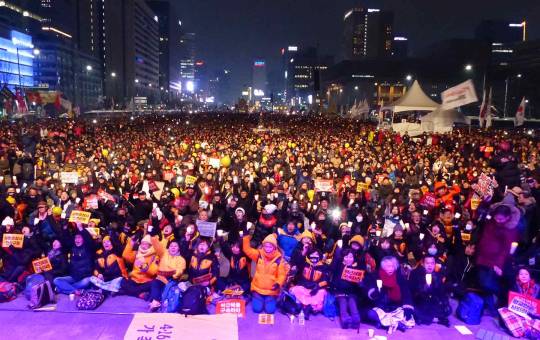
(2016 Candlelight Protests)
The president who succeeded Park, Moon Jae-in, promoted Yoon within the prosecution service. At his new position, Yoon prosecuted and imprisoned Park, as well as another conservative former president. At this point, he was becoming a major public figure, popular among democrats and hated among conservatives. So President Moon promoted Yoon again, this time to Supreme Prosecutor of the entire service.
And then, Yoon started investigating Moon's own justice minister. This led to a public dispute. Moon's government looked corrupt and hypocritical, and Yoon became more popular than ever. Soon, Yoon resigned his office and entered the conservative presidential primary.
Of course, conservatives welcomed Yoon's entry, and he won the primary and the presidency. But how did they go from hating him for destroying their president to fighting to get him elected? How did Yoon go from prosecuting a corrupt conservative to being one?
The reason for the switch from Park to Yoon lies in their political brands.
Park Geun-hye's brand was built on nostalgia for her authoritarian father. Many older South Koreans associate Park Chung-hee's regime with stability, rational economic management, and anticommunism. At the same time, even most conservative voters hate actual authoritarian behavior. All South Koreans have either lived under military dictatorship or have heard from their family what it was like, and almost nobody is eager to return. Once Park Geun-hye's corruption and inept attempts at election manipulation were revealed, she was finished.
This is why conservatives welcomed Yoon Suk-yeol into their party: they needed him to wash their hands of corruption. He was a rebirth of authoritarian discipline made acceptable by his prosecution of unpopular conservatives. His message was law and order: if we lock up the corrupt, criminals, and communists, the country can be saved from ruin. If we push workers harder (by increasing work hours), economic growth will continue. If we push women harder (by forcing a return to traditional gender roles), the birth rate will return to normal. And, of course, the chaebols should be deregulated and given tax cuts.
Together Democratic Party
Before we pick things back up with Yoon, his main opposition is worth a look. This is the Together Democratic Party, which along with other opposition parties blocked the declaration of martial law and is now pushing for Yoon's impeachment.
We can summarize the Democratic Party's traditional and typical outlook in the figure of President Moon Jae-in (Mun Jaein). This was Park Geun-hye's main rival and the president who promoted Yoon Seok-yeol. He can be considered something like the "Korean Barack Obama". He was liked by democrats and called a dangerous communist by conservatives, but he didn't do all that much in reality other than raising the minimum wage, reducing the workweek, and attempting diplomacy with North Korea. He is now generally liked because things felt normal, he handled the COVID-19 pandemic well, and he didn't make any earth-shattering mistakes. He's the only living president not to be imprisoned after leaving office.
For decades, the Democratic Party was this type of moderate reformist, center-right party. However, in just the past few years, the party has gone through a considerable transformation.
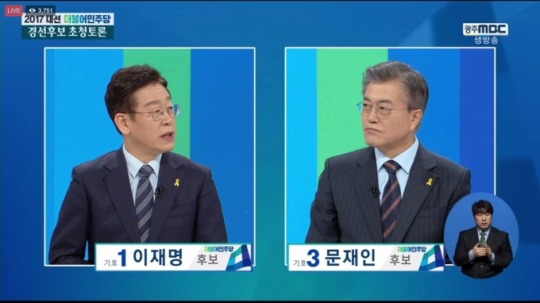
(A 2017 Democratic presidential primary debate, with Lee on the left and Moon on the right.)
The Democratic Party has now unquestionably become the party of a person named Lee Jae-myung (Yi Jaemyeong), who was elected party leader in 2022. He's been called the "Korean Bernie Sanders", and this label is at least somewhat accurate.
Like Bernie Sanders, Lee Jae-myung can be characterized as a radical social democrat. His policies could actually be characterized as more radical than Bernie Sanders'. As the governor of Gyeonggi Province, Lee introduced a youth basic income and experimented with universal basic income. As a national political figure, Lee pushes for what he calls his "Basic Society" policies. These include universal basic income, youth basic income, universal basic housing (by massively expanding public housing), expanding free healthcare coverage to nursing, free meals for seniors, and a four day workweek. In general, Lee criticizes means-tested welfare and advocates for universal programs that guarantee a baseline standard of living by right.
On the other hand, Lee could also be characterized as less radical than his policies would imply. A common criticism, which ironically comes from both conservatives and leftists, is that he doesn't often talk about how to pay for his policies. Conservatives see this as a sign of irresponsible populism and economic illiteracy, while leftists criticize him for not naming the enemy. Unlike Bernie Sanders, Lee doesn't rail against chaebols or inequality or push for taxes on the rich. He also tends to appeal to questionable technology like AI rather than collective action. So although Lee champions some genuinely radical policies, he certainly isn't a socialist.
Lee's public image is also quite different from someone like Bernie Sanders. Lee is generally seen as a figure of questionable morality due to a constant conveyor belt of personal scandals and corruption allegations. He has been accused of, among other things, abusing his staff, having his brother involuntarily committed, illegally sending money to North Korea using an underwear factory, and having connections to organized crime. Lee's personal legal controversies have been the greatest source of instability for him and the Democratic Party since he became its leader.
In fact, Lee was recently convicted of lying while campaigning in one of his trials in November. Due to now having a criminal conviction, he is technically barred from running for office again. However, the conviction could still be overturned on appeal and recent events have really thrown everything up in the air. And even if Lee himself can't run for office, his ideology has taken over the Democratic Party and it's likely that whoever succeeds him will share it.
So, Lee Jae-myung is the nemesis that Yoon Seok-yeol has been fighting for his whole presidency. A criminal versus a prosecutor. Universalism versus austerity. Relief versus discipline.
Yoon Suk-yeol's presidency
Finally, we return to President Yoon. Though even as a prosecutor he was a figure of questionable intelligence, as a politician he's revealed himself to be one of the most inept people in modern history.
Since the beginning of his term, Yoon has been unable to do nearly anything at all domestically. The Democratic Party already had a majority in Parliament at the beginning of his presidency, and so Yoon has been unable to enact literally any part of his legislative agenda. Instead, he was reduced to calling young people lazy, bemoaning the far too short workweek, and wishing he could cut welfare.
In April of 2024, parliamentary elections were held. Lee Jae-myung, Democratic party leader, used the primary process as an opportunity to purge the party of centrists. Despite the Democratic Party's parliamentary candidates being further left than they'd ever been, opposition parties expanded their hold over the Parliament and nearly won a supermajority. After their victory, Lee Jae-myung was reelected as party leader and Basic Society advocates were elected to every seat on the party's supreme council. The Democratic Party emerged more left-wing, more ideologically unified, and more powerful than it ever had been before.
Now that Lee's Basic Society ideology had consolidated its hold on the Democratic Party and the Parliament, the Parliament began trying to pass its agenda in earnest. The Parliament passed bills establishing an experimental UBI, preventing companies from suing workers for striking, and expanding labor protections to subcontractors, among others. Over and over, Yoon vetoed them. Yoon has vetoed 19 bills and pocket-vetoed 4 more, more than every other South Korean president combined.
Both Yoon and the Parliament accused each other of being obstructionists. The problem for Yoon was that the Parliament's policies were popular, while his policies were unpopular. As Yoon issued more and more vetoes, his approval rating only fell.

(A political cartoon by Bak Sunchan depicting Yoon as a lame duck saying "veto")
Without the ability to change domestic policy, Yoon put all of his energy into foreign policy. Due to their history and composition, conservatives want to maintain trading links with other developed countries and developing countries for the chaebols to export to, want to maintain anticommunist alliances with the US and Japan, and are hostile to North Korea. (Participation in this system is what led the South Korean military to commit atrocities in Vietnam.) Democrats are somewhat skeptical of both the US and Japan, and want reconciliation with North Korea. Yoon has been strengthening relations with the US and Japan, sending weapons to Ukraine, and taking a hard line against North Korea.
Although several of these efforts were unpopular, the most significant has probably been Yoon allowing Japan to list the Sado gold mine as a UNESCO World Heritage Site. Before Yoon, South Korea had been blocking this because the site failed to mention the thousands of Korean slaves forced to work in the mine during WW2.
So, the two years of Yoon's presidency had so far consisted of Yoon obstructing popular reforms while failing to pass unpopular reforms and engaging in unpopular war crime denialism. He was generally regarded as impotent, laughable, and annoying. And at the same time, allegations of Yoon's own corruption grew louder and louder.
Yoon's wife is accused of taking bribes and meddling in the conservative primary. Yoon's friend, a Marine Corps officer, is accused of negligence that resulted in a young conscript's death. Yoon is accused of using his friends in the prosecution service to interfere with both investigations. As these scandals grew, the Parliament passed bills appointing special prosecutors independent from the prosecution service to investigate them. Many of Yoon's vetoes were of these special prosecutor bills.
Since the parliamentary elections in April, Yoon has been stuck in a vicious cycle. The Parliament passes popular legislation and Yoon vetoes it. Yoon's approval rating falls. The Parliament passes a bill to investigate Yoon and Yoon vetoes it. More information and leaks about Yoon's corruption come out. Yoon's approval rating falls, eventually to 18 percent. Afraid of the public pressure, more conservative MPs distance themselves from Yoon.
It seemed inevitable that eventually, enough conservative MPs would defect to override Yoon's veto and appoint a special prosecutor. A special prosecutor would find evidence of Yoon's corruption. The public would grow only angrier with Yoon. The only road left would be impeachment and imprisonment, just like Park Geun-hye. Yoon bashed his head against the wall, unable to find a way out.
Clearly, somewhere in this pile was the final straw. On 12.3 at 10:23 PM, Yoon Seok-yeol turned on the camera and vomited blood.
So, what does the coup mean?
The declaration of martial law was so bewildering because it felt like it came out of nowhere. But that's not strictly true; the Democratic Party had been warning that Yoon was plotting to declare martial law for months. Most people dismissed this as a conspiracy theory, including myself. It was simply too far-fetched and illogical to contemplate, until it happened.
But the real reason it felt like it came out of nowhere was because, at the same time, it did. Not even Yoon's most devoted supporters were thinking about martial law. Apparently, everyone from the leader of Yoon's party to the Ministry of Defense to his own prime minister was caught totally by surprise. He circulated no conspiracy theories in advance, and not a single news network attempted to justify his actions. He had no cult of personality and no party ready to fall unquestioningly behind him. In short, he acted essentially alone. As soon as people rose up in defiance, he had no choice but to back down.
It's a good sign for South Korean democracy that the people defeated the self-coup attempt so quickly and decisively. But compare the political environment with that of other countries. How normal has authoritarianism become? How many people openly wish for a dictator? How subservient are the cabinet officials and the news networks? How cultlike are the major parties and how acquiescent is the opposition? These conditions make a country much more vulnerable to a ruler with authoritarian instincts. And we should expect authoritarians to act in creative and unprecedented ways.
The self-coup is an explosion of the authoritarian tendencies that have been bubbling under the surface of the conservative movement since the end of military rule. It's a decisive discrediting of Yoon's prosecutorial brand, which had been conservatism's last hope to maintain the people's trust. Yoon's impeachment and imprisonment are all but guaranteed. And the general consensus among both democrats and conservatives now is that Yoon's blunder has killed conservatism in South Korea for at least the next decade.
In fact, the 12.3 declaration of martial law might really have been a successful self-coup. In that the conservatives have removed themselves from power. And the death of the right is a golden opportunity that Korean leftists must seize. If Lee Jae-myung's Democratic Party becomes politically dominant, it must be challenged from the left to properly name the enemy. If the Basic Society policies become normalized, the left should treat them as common sense and demand more. When people become disenchanted with the democrats, the left must be ready as their competitor and obvious alternative, not the right.
Could South Korea see a new era of competition between a socialist left that wants to finally do away with the chaebols, a social democratic center that merely wants UBI, and a nonexistent right?
Maybe. Probably not. But a new world of possibilities has opened up.
#south korea#yoon suk-yeol#politics#news#12.3#martial law#lee jae-myung#park chung-hee#park geun-hye#korea#moon jae-in#democratic party#authoritarianism#coup#history
282 notes
·
View notes
Text
The Many Ills of Canon South Korea(as explained by a South Korean)
Ik a lot of people might feel a knee-jerk reaction to this and go "why are you making this? it's been a long time since the character was banned and went into oblivion," and that's true. However, I find that a lot of characteristics of how South Korea was written has been carried on by some Hetalia fans, which are still problematic and rooted in pro-Japanese imperialist sentiment.
Here, I'll try my best to go over some major points, starting with Korea's canon design.
Character Design
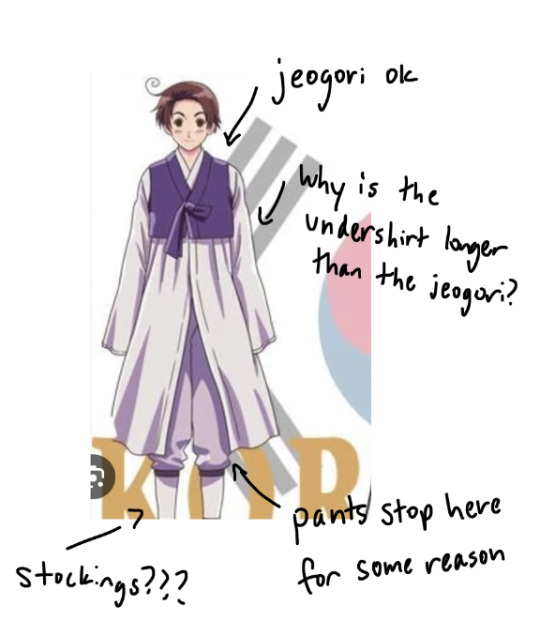
Looking at this for the first time, I felt like I was on some kind of trip. It looked like Himaruya was indecisive of whether he wanted Yongsoo to wear a durumagi or a jeogori, so he said "let's make the undershirt as long as a durumagi!"
For reference, left is a jeogori and pants outfit and right is a durumagi and pants outfit. These are the 2 main hanbok types for men.
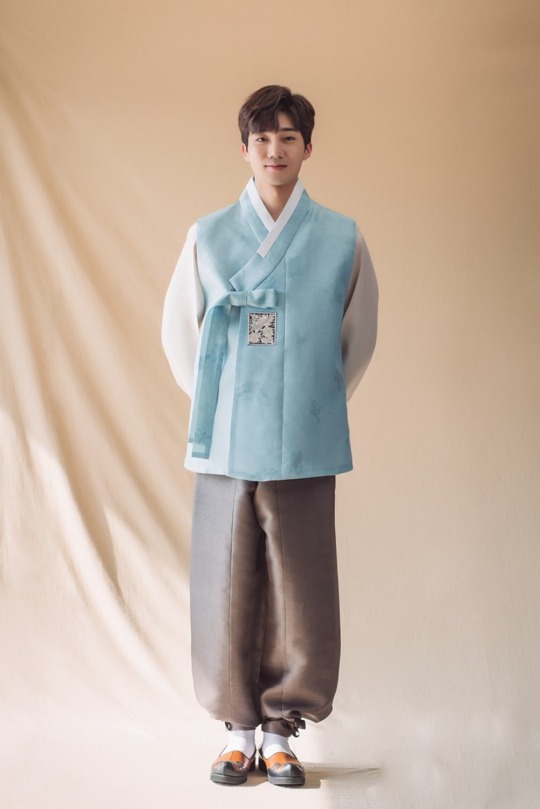
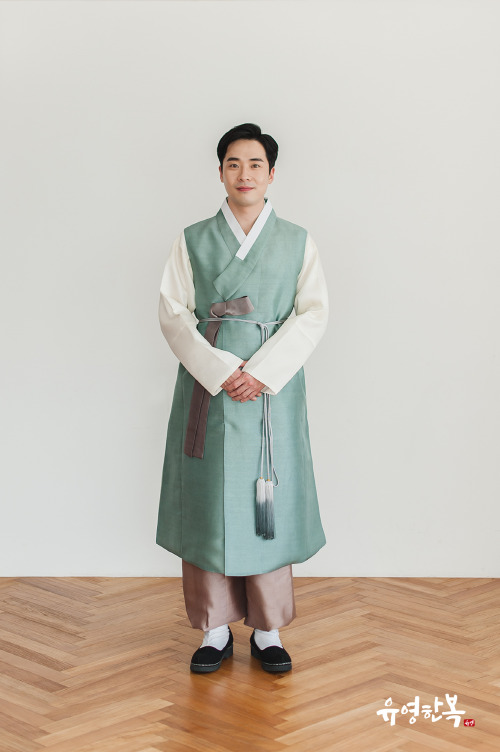
I can't think of a single character whose character design was this flawed and so inaccurately done. It's like he didn't even care or put any thought into Korean traditional wear. It makes me laugh when I see how Japan is given such accurate clothing in contrast.
His clothing is a caricature of what Korean wear is. Thankfully, I don't see a lot of art of him wearing it anymore, but when it does appear it really does feel disrespectful.
His Personality
I don't really have a problem with his energetic personality, but if you know anything about his depiction in the manga, you know what I'll be talking about:
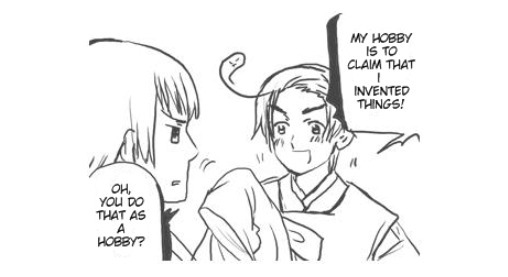

His "hobby" where he takes credit for inventions, and his weird "quirk" involving sexually harassing Japan.
What...was the reason for this exactly? A lot of personality quirks and gags of characters are rooted in some existing stereotype many people attribute to the country, like
America -> eats a lot of food, bright colored cake -> US's reputation as a country with a lot of fast food and artificially colored desserts
England -> food is inedible -> England's reputation of unappetizing foods
Korea -> claims credit for other countries' creations(Mostly Japan's), sexually harasses Japan -> ?????
This is why I don't accept some Westerners trying to brush South Korea aside "because everyone gets dunked on in Hetalia!" yes, but to what degree?
A Japanese man writing his Korean character to be stealing from the Japanese one says a lot, that Korea doesn't have a culture of its own, or most of it isn't their own. Or daresay, Korea takes Japanese culture and claims it to be their own. All three of these conclusions are problematic, and audacious coming from a person hailing from the empire that attempted to stamp our culture out and penalized those trying to preserve our culture.
The "grabbing Japan's chest" bit originates from an ongoing political dispute of an island known as Dokdo, or as Japan calls it, Takeshima. Personally, I'd agree that Dokdo belongs to Korea, referring to maps produced by Japan from the 1800s:
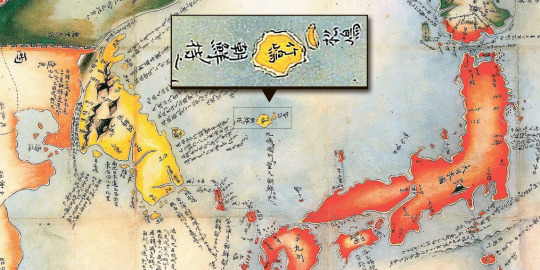
Yellow is marked as Korean land, with even the writing labeling it as "Joseon Land." But regardless of which side is correct, there is something about taking an ongoing territorial dispute(it was a much bigger issue while Himaruya was writing Hetalia) and applying it with the context of "haha he grabs Japan's chest."
It paints Korea as unreasonable and a sexual assaulter so that Korean grievances against Japan can be dismissed. Additionally, both countries have a rampant sexual assault issue(my phone's shutter sound cannot be turned off–a feature of phones only made in/for Korea and Japan), which is why it's also insensitive to give this trait to Korea and make light of this sensitive topic, while also...not extending this to Japan.
Let's not mention making Korea the harasser given the history and Japan's position too. Korea's red light districts and sex/entertainment industry was started by and formalized by the Japanese occupation so they could exploit Korean women.
"Korea had been a Japanese colony since 1910, and the proximity of colonial Korea to Japan, its established colonial bureaucracy and transportation network, and the presumed “cleanliness” of its young female population meant that likely the largest percentage of comfort women came from Korea. Another reason for the large numbers of Korean girls and young women in the comfort women system was the well-developed state of the Japanese colonial sex industry in Korea and its networks of human trafficking. This industry, which had been growing with Japanese encouragement since the late nineteenth century, blossomed under the Japanese colonization of Korea (1910–45) and provided networks for obtaining and trafficking sexual slaves." - Music and Dance in the Japanese Military “Comfort Women” System: A Case Study in the Performing Arts, War, and Sexual Violence by Joshua D Pilzer
Now, the "claiming everything is Korean" bit. The whole gag is Korea is delusional haha look he's claiming something Japan made as his!! While Japan is just looking at him like "ok...sure..go off whatever ig." Again, making Korea to be an unreasonable childish character while Japan is mature and just trying to get along, let bygones be bygones! Look at the sassy child I have to deal with guys!!!
Speaking of "sassy child..."
Korea's age
I haven't checked the wiki in a hot minute, but there were 2 details of his age I remember.
he's 15
he was "born" 1945(liberation of Korea from Japan) or 1948(Creation of South Korean govt)
This would be contrary to even the manga, as it references a painting by a Japanese artist in the 1700s of what he assumed were Joseon messengers stealing chickens during their mission to Japan. Korea was alive then as depicted in the picture referencing the real one, so it's safe to say his existence should predate even 1945.
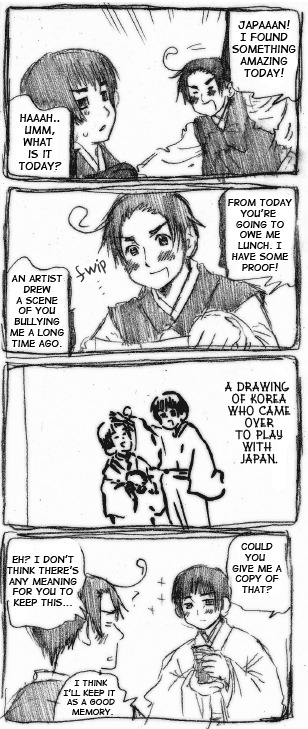
(Interesting to note that Himaruya says that Koreans interpret it as Japanese bullying the Korean envoys, when Korean sources actually suggest it could be children playing around.)
Even if Korea was set to be born 1945 or 1948, it doesn't do us justice. Why do we not have a history before colonization? How is it that Korea could be even younger than America, when the Joseon Dynasty was established a century before Christopher Columbus reached America in 1492? How is it that Japan gets to be older and Korea doesn't?
It's glaringly obvious, but Korea's "childish, immature personality" stems from Japanese imperialist rhetoric of Koreans during the Colonial Era, of people needing to be civilized.
"In April 1919, Baron Goto Shinpei (Home Minister, 1916–1918) addressed a luncheon attended by US Treasurer John Burke. Goto contended that Japan did not act duplicitously in 1905, but instead, “with the full cognizance of the United States government.” "He added, “under the efficient government of Japan, the Korean people rapidly advanced in civilization and enjoyed the blessings resulting from the development of productive industry, as well as the spread of education." - The March First Movement in America: The Campaign to Win American Support by Brandon Palmer
The most important thing to remember in all of this was that during the time of Korea's controversy, Anti-Japanese sentiment was still quite high because of the unhealed wounds as a result of 35 years of Japanese Occupation. When you think about your colonizer making a personification of your country and depicting him as
-someone that copies from the colonizer and harasses them, a contrast to the "mature" colonizer
-someone with barely a history before the colonizer
-someone who's clothes are so wildly inaccurate
then wouldn't you too be enraged? This is what caused the National Assembly to ban the official airing of the anime, and official releases of the manga. You'll notice even these days Koreans are hostile towards Hetalia, even as the incident happened years ago, whereas the Countryhumans had a large Korean following and creators, because one of them was openly treating their country like a personification from a political cartoon found in a 1920s Japanese newspaper, and the other was fan created.
I hope this perspective was helpful in explaining why certain qualities of canon are disrespectful. Please remember before defending "canon" Hetalia, Hetalia is made by a Japanese author who was found to have been on Japanese right wing forums. Don't try to convince a Korean that his depiction/canon of Korea is respectful.
#hetalia#aph south korea#hws south korea#aph korea#hws korea#im yong soo#I might edit this a bit later hmm#its 4am LOL#or I'll make a part 2?#but these were the 3 main things I wanted to explain. maybe I'll go into detail later about how people refuse to learn about korea#other than from canon and classic stereotypes of “Kpop nerd gamer”#do you like korea or the caricature#let's see if I have time to sleep lol
180 notes
·
View notes
Note
hey! this is a dumb question, but why are general secretaries elected for life?
They aren't. The procedure in democratic centralism is that a Congress is called periodically, typically every 4-5 years though that might vary, where a new Central Committee and its associated organs are elected, including the General Secretary. The Congress is the most powerful organ in a communist party, above the CC and gensec. Members of the party are chosen as delegates from their local cells, and they each have one vote, as well as having the duty to participate in the debates.
In the USSR, Lenin was actually never the general secretary, then Stalin was elected repeatedly despite him asking to step down multiple times. He died whole being gensec. Khruschev was replaced by Brezhnev in 1964. Brezhnev did die in 1982, and afterwards there were two quick successions both ended with the person holding the position dying, Andropov in 1984 and Chernenko in 1985. Gorbachev of course died 2 years ago, as he was overthrown. It is true that after Stalin the USSR had a very aged leadership, that's why Brezhnev, and especially Andropov and Chernenko died in the position.
In Cuba, before the revolution, only José Peña Vilaboa died while being first secretary and he only held it for a year or two. Fidel left office in 2011 and he died in 2016. Raúl Castro succeeded him and he left office in 2021, he's still alive. Now it's Miguel Díaz Canel who is 64.
In Vietnam, Trần Phú died while in office in 1935, then it wasn't until 6 general secretaries/first secretaries, including Hồ Chí Minh who died 9 years after leaving the position, Lê Duẩn died while in charge in 1986. No other general secretaries have died except for Nguyễn Phú Trọng who died last year.
In China, there is more of a marked difference between the state and party, but it's honestly not that hard to research. Most have not died in office.
The DPRK is a big exception, the Worker's Party of Korea, which to be clear isn't even the only party in the DPRK, has had 3 previous general secretaries (Kim Tu-Bong, Kim Il Sung, Kim Jong Il) who have all died in office. I'm sure someone can explain this in more depth, but the Kim family was so well-regarded and initially chose as general secretaries because they were almost legendary guerilla fighters against Japanese occupation, especially Kim Il Sung. Anna Louise Strong talks about this more here in chapter 3 Government and Elections. Whatever the case, each member of the Kim family has been very involved in the WPK, and due to the accumulated experience elected.
Whichever country you were thinking of when you sent this ask, which is probably the USSR or the DPRK, nobody is chosen until death. These positions are regularly and democratically renewed or reconfirmed, and I don't think that someone being elected multiple times is undemocratic. If people are happy with how something is run, why would they change it? and besides, let me remind you the General Secretary is not that supremely powerful. All decisions in a democratic-centralism system are taken collectively, taking into account previous debates and the constant feedback from the base. Many, many people are involved who the Central Committee rely on, and the CC itself often changes members even more between congresses. Idk, the USamericans chose FDR for almost 4 terms an nobody talks about the FDR dictatorship. It's not hard to believe maybe FDR was simply a good president most people liked, and who was in charge during a crucial time. The DPRK has been under constant siege since its very creation, under sanctions and with some of the largest military bases and exercises on its border, run by the people who killed around a fifth of your people. Changing leadership often might also be conducive to instability and a rapidly-changing course, which the Korean people would understandibly not want.
Same with Stalin. He was the general secretary during a crucial time, the collectivization of work and industrialization on par with the US and western Europe, followed by the Nazi-fascist invasion, and then the very costly reconstruction.
Non-ruling democratic-centralist parties typically have a much faster rotation of general/first secretaries, you can look at a list on Wikipedia for most parties out there and you can compare with their death dates.
199 notes
·
View notes